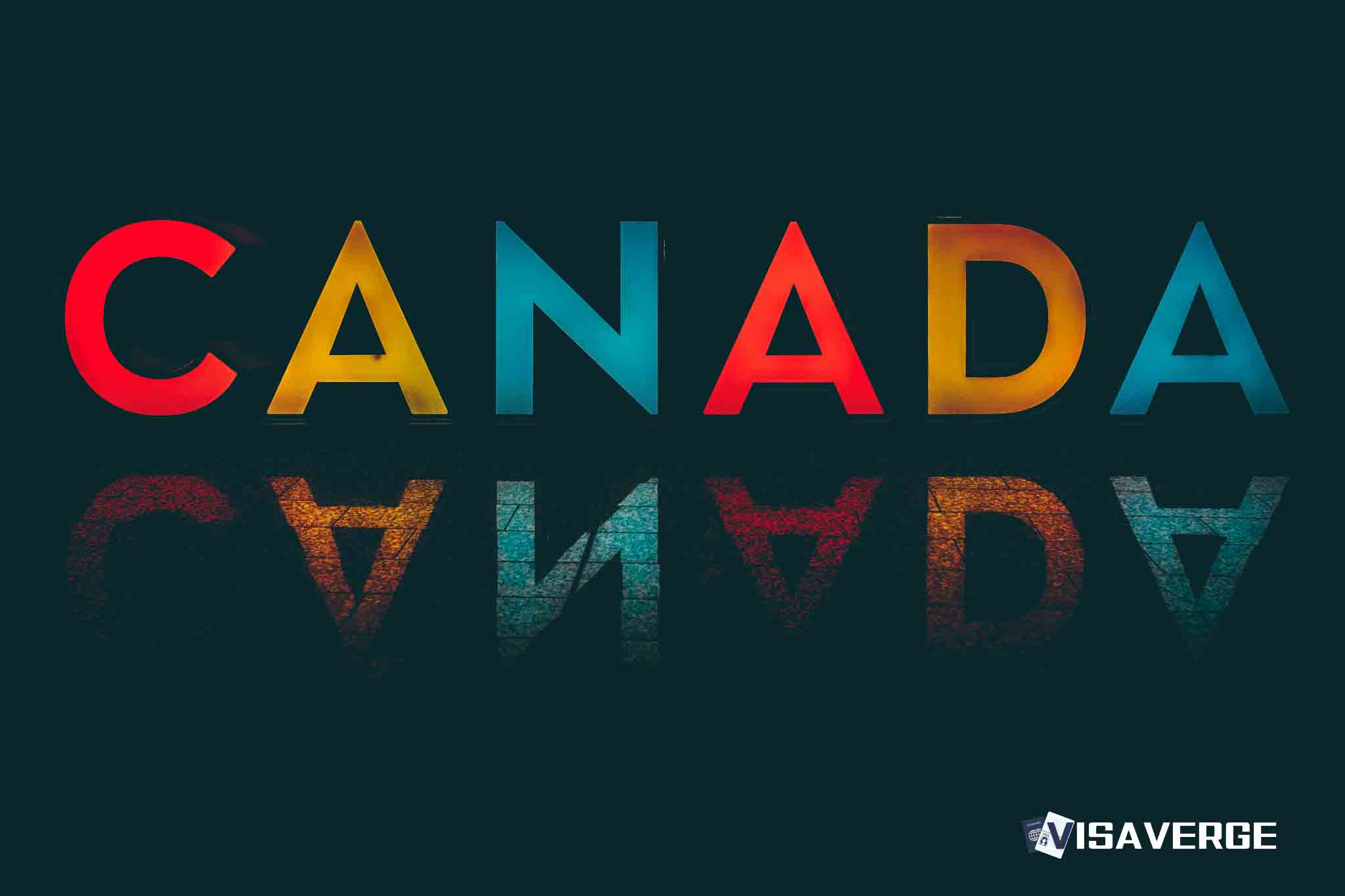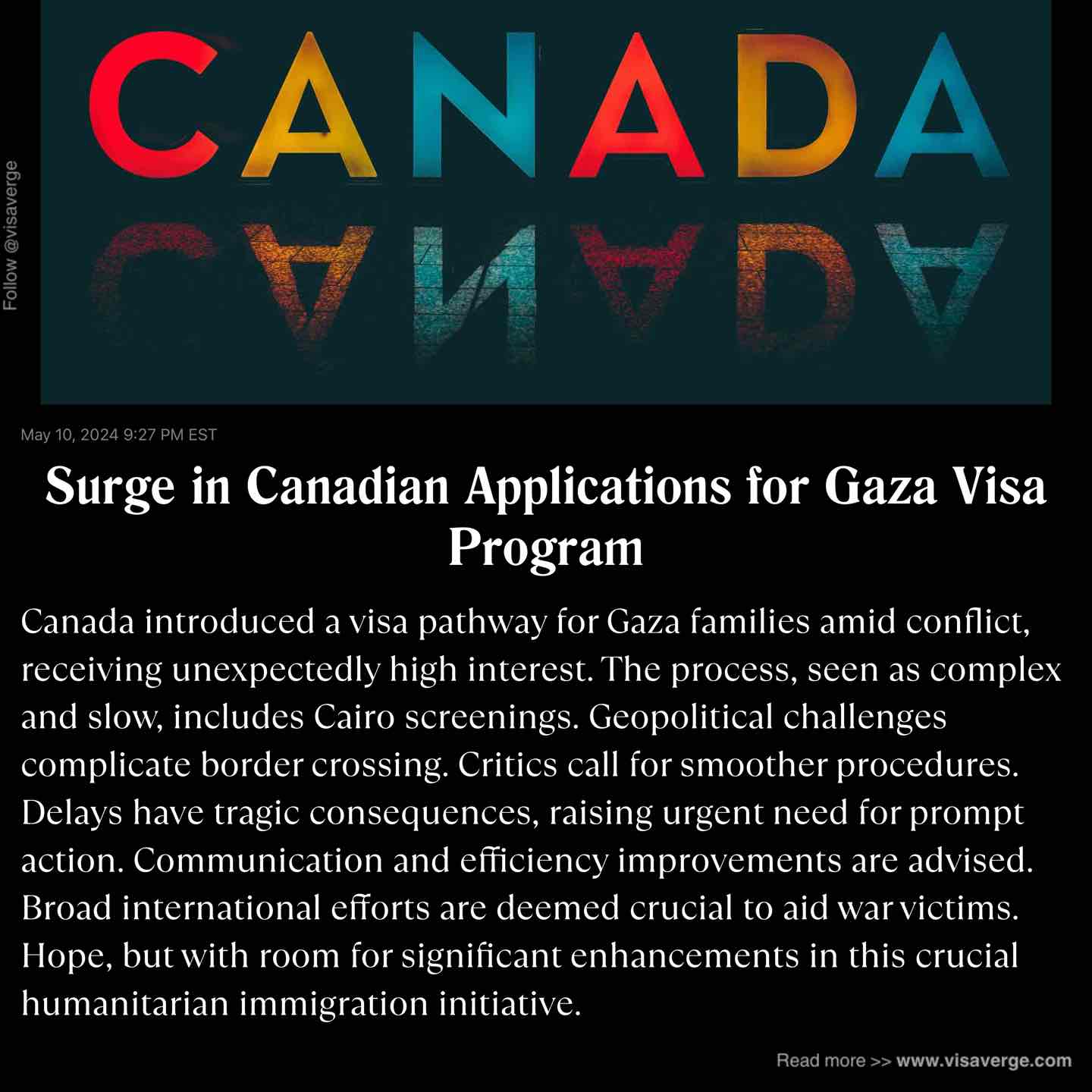What Is the Canadian Visa Pathway for Gaza?
In a significant mobilization by the Canadian government, a visa pathway was introduced to assist families trying to relocate their relatives from Gaza. The initiative started on January 9 and was primarily directed at helping those affected by the Israeli-Hamas conflict. This family immigration program was initially expected to cater to hundreds, according to Immigration Minister Marc Miller. Surprisingly, over three months, more than 7,500 Canadians applied for this pathway, indicating a much greater demand than anticipated.

How Challenging Is the Visa Process?
This Canadian visa pathway, designed to grant temporary refuge, has been described by various immigration lawyers as complex and strenuous. Debbie Rachlis, a Toronto-based immigration lawyer, states that the application process feels “onerous, chaotic and nearly impossible to complete.” From the significant number of applications — 7,549 initial statutory declarations filed from January 9 to April 1 — only 179 Gaza visas had been issued by April 29.
Applicants begin with a statutory declaration followed by an online form detailing their situation. If this initial stage is successful, they receive a unique code to proceed. However, the necessity for family members to travel to Cairo for a final security screening complicates the situation, particularly with heightened border restrictions and logistical hurdles.
What Roadblocks Do Applicants Face?
The major challenge has been the final step of crossing from Rafah to Cairo for that last security screening. The situation is exacerbated by geopolitical developments, such as Israel’s recent control over the border, making it even more difficult for Gazans to leave. Some families have resorted to paying significant sums to private companies for assistance in border crossing, underlining their desperation and the obstacles faced in the visa process.
Canadian lawyers and advocates have criticized the government for not doing enough to streamline this process. Annie O’Dell, a Newfoundland-based immigration lawyer, suggests that “Canada could do more to lift some of the visa’s excessive security requirements and get the documents to people sooner.” This advice points to a need for more responsive and humane policy adjustments to expedite family immigration amidst crises.
How Is Canada Addressing These Challenges?
Despite the outcry from various quarters, including the National Council of Canadian Muslims and numerous lawyers, the Canadian government initially capped the program at 1,000 applications. However, this cap has since been revisited, with promises to consider more applications, although no specific numbers have been set forth yet. As of March 4, only 986 “complete” applications were being processed, showing little progress from previous reports.
What Are the Broader Implications of Delays?
The delays in processing and the cumbersome requirements have had tragic consequences. For instance, a Palestinian-Canadian woman, represented by Annie O’Dell, applied for a visa for her brother and niece in January. Sadly, her brother died from starvation before any progress could be made on their applications. This case underlines the dire situations that many Gazans are facing and the critical importance of timely processing by Canadian authorities.
O’Dell poignantly questioned the fate of many who applied: “I do wonder how many of those … applications have gone out for people who are now dead.” This statement captures the frustration and helplessness felt by many Canadians trying to aid their relatives.
What Could Be Improved?
Experts like Debbie Rachlis believe that the Canadian government could enhance its communication with applicants who have invested time, money, and hope in the process. Some applicants receive immediate responses while others wait indefinitely, adding to the uncertainty and stress experienced by families.
Rachlis also suggested that Canada doesn’t want to contribute to the depopulation of Gaza, which might explain some hesitations in expediting the visa process. Nevertheless, she and other advocates agree that more robust initiatives are essential, not just from Canada but internationally, to protect war victims and facilitate their safe relocation.
Conclusion
While the Canadian family immigration program for Gazans has provided a gleam of hope for many, the execution and operational challenges have dampened its efficacy. With thousands of lives in the balance, there is a pressing need for improved measures and international cooperation to ensure that those in conflict zones can find refuge and safety.
For those seeking more information or who need to navigate the complexities of Canadian immigration, comprehensive details and assistance can be found on the official Department of Immigration, Refugees and Citizenship Canada website. This resource offers critical insights and guidelines on navigating the visa application process, essential for anyone looking to bring family members to Canada from crisis zones like Gaza.
Learn Today:
Glossary or Definitions
- Visa Pathway: A designated route or program established by a country, such as Canada, to facilitate the immigration process for a specific group of individuals, in this case, families seeking to relocate their relatives from Gaza. The visa pathway typically outlines the steps, requirements, and procedures applicants must follow to seek entry and legal status in the host country.
-
Statutory Declaration: A formal written statement made under oath or affirmation, typically required as part of the initial application process for immigration programs. In the context of the Canadian visa pathway for Gaza, applicants are often expected to provide statutory declarations detailing their situation and reasons for seeking relocation.
-
Security Screening: A thorough examination conducted by authorities to assess the security risks associated with an individual or a group seeking entry into a country. In the case of the Canadian visa process for Gaza, the final security screening, which involves traveling to Cairo for some applicants, plays a crucial role in determining eligibility for visa issuance.
-
Border Crossing: The act of moving from one country to another through designated points of entry, such as land borders or checkpoints. For applicants of the Canadian visa pathway from Gaza, the border crossing from Rafah to Cairo poses a significant challenge due to logistical hurdles, heightened border restrictions, and geopolitical developments affecting the region.
-
Humanitarian Crisis: A situation where widespread human suffering, such as displacement, violence, or inadequate living conditions, necessitates urgent humanitarian assistance and action. The delays and challenges faced by applicants in the Canadian visa program highlight the humanitarian crisis in Gaza and the critical need for expedited processes to ensure the safety and well-being of those affected by conflicts and crises.
This Article In A Nutshell:
The Canadian Visa Pathway offers hope for Gaza families. However, with fewer visas issued than expected, the process faces challenges. Delays, complex procedures, and border crossing issues hinder applicants. Calls for more efficient processes and increased support have emerged to aid those seeking refuge amidst crises. Solutions require swift action and international cooperation.
— By VisaVerge.com
Read More:
- UK Student Visa Revoked Amid Political Protest – Discover the story of Dana Abuqamar, a student whose UK visa was cancelled following participation in a pro-Palestine rally.
-
Important Advisory for Indian Students in the US – Learn about the warnings issued to Indian students in the US regarding participation in protests and the potential impacts on their visa status.
-
Why Indian Students are Staying Away from US Protests – Understand the concerns holding back Indian students in the US from engaging in public demonstrations.
-
Risks of Deportation for Non-Citizens Joining Protests – A detailed analysis on how participating in protests can affect the immigration status of non-citizens in conflict-sensitive situations.














